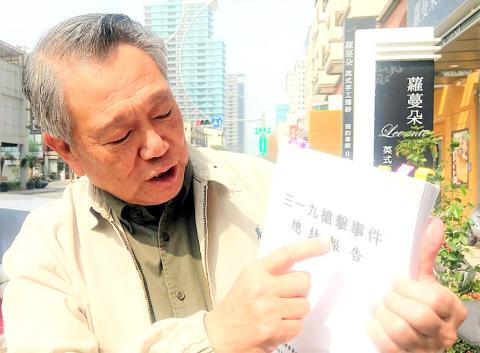Chinese Nationalist Party (KMT) chairman candidate Steve Chan (詹啟賢) yesterday published a series of slides to answer some of the questions about the “319 shooting incident” involving former president Chen Shui-bian (陳水扁), in a bid to fend off speculation within the party about his potential role in the incident.
“Exactly 13 years ago today, a significant incident occurred in Taiwan. Even 13 years later, people still ask me questions about it,” Chan wrote on Facebook, saying that his name has been associated with the shooting although he was not the one who pulled the trigger.
The 319 shooting incident refers to an alleged assassination attempt against Chen and then-vice president Annette Lu (呂秀蓮) in Tainan on March 19, 2004, one day before the presidential election.

Photo: CNA
A bullet grazed Chen’s stomach and left a 13cm wound, while another bullet hit Lu in the knee.
The incident sparked conspiracy theories, as Chen later won the election by less than 30,000 votes.
Although an investigation identified the gunman as Chen Yi-hsiung (陳義雄), a Tainan resident who apparently committed suicide shortly after the incident, some people question whether he was the shooter or if he acted alone.
Chan, the then-superintendent of Chi Mei Medical Center, whose Tainan branch treated Chen Shui-bian and Lu, is facing accuations that he might have covered up the incident’s details as the KMT’s May 20 chairperson election draws near.
Shrugging off questions about why the two Democratic Progressive Party candidates were not sent to a hospital closer to the crime scene for treatment, Chan said Chi Mei’s Tainan branch was the closest hospital by the time the doctor accompanying Chen Shui-bian examined his injuries.
“The choice was made after various traffic factors were considered to determine which hospital could be reached within the shortest time,” Chan said.
Chan also cited video recordings of Chen Shui-bian’s treatment to dismiss speculation that his injuries might have been fabricated, saying that he had no prior knowledge about the attack and that he was getting a haircut when Chen Shui-bian arrived at the hospital.
Regarding former KMT legislator Wang Chung-yu’s (王鍾渝) allegation that a nurse at the hospital was told to “stand by” a day before the attack, Chan said the claim was most likely a fabrication, as the hospital was unable to identify the nurse.
Although many questions remain unanswered, such as whether the shooting was authentic, whether Chen Shui-bian really sustained a bullet wound and whether the alleged shooter was murdered, one thing is certain: “Chi Mei Medical Center and I played no part in the attack,” Chan said.
“We provided nothing but professional medical service,” he added.

ALIGNED THINKING: Taiwan and Japan have a mutual interest in trade, culture and engineering, and can work together for stability, Cho Jung-tai said Taiwan and Japan are two like-minded countries willing to work together to form a “safety barrier” in the Indo-Pacific region, Premier Cho Jung-tai (卓榮泰) yesterday said at the opening ceremony of the 35th Taiwan-Japan Modern Engineering and Technology Symposium in Taipei. Taiwan and Japan are close geographically and closer emotionally, he added. Citing the overflowing of a barrier lake in the Mataian River (馬太鞍溪) in September, Cho said the submersible water level sensors given by Japan during the disaster helped Taiwan monitor the lake’s water levels more accurately. Japan also provided a lot of vaccines early in the outbreak of the COVID-19 pandemic,

Kaohsiung Mayor Chen Chi-mai (陳其邁) on Monday announced light shows and themed traffic lights to welcome fans of South Korean pop group Twice to the port city. The group is to play Kaohsiung on Saturday as part of its “This Is For” world tour. It would be the group’s first performance in Taiwan since its debut 10 years ago. The all-female group consists of five South Koreans, three Japanese and Tainan’s Chou Tzu-yu (周子瑜), the first Taiwan-born and raised member of a South Korean girl group. To promote the group’s arrival, the city has been holding a series of events, including a pop-up

The Ministry of Foreign Affairs (MOFA) yesterday voiced dissatisfaction with the Comprehensive and Progressive Agreement for Trans- Pacific Partnership (CPTPP), whose latest meeting, concluded earlier the same day, appeared not to address the country’s application. In a statement, MOFA said the CPTPP commission had "once again failed to fairly process Taiwan’s application," attributing the inaction to the bloc’s "succumbing to political pressure," without elaborating. Taiwan submitted its CPTPP application under the name "Separate Customs Territory of Taiwan, Penghu, Kinmen and Matsu" on Sept. 22, 2021 -- less than a week after China

TEMPORAL/SPIRITUAL: Beijing’s claim that the next Buddhist leader must come from China is a heavy-handed political maneuver that will fall flat-faced, experts said China’s requirement that the Dalai Lama’s reincarnation to be born in China and approved by Beijing has drawn criticism, with experts at a forum in Taipei yesterday saying that if Beijing were to put forth its own Dalai Lama, the person would not be recognized by the Tibetan Buddhist community. The experts made a remarks at the two-day forum hosted by the Tibet Religious Foundation of His Holiness the Dalai Lama titled: “The Snow Land Forum: Finding Common Ground on Tibet.” China says it has the right to determine the Dalai Lama’s reincarnation, as it claims sovereignty over Tibet since ancient times,